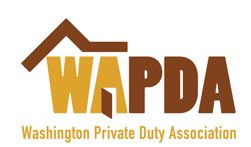One of the topics at the 2008 annual conference of the Washington Private Duty Association (WAPDA), was how to provide home care aides with effective supervision. Presenting at the session were top administrators from two well-established Western Washington area private duty home care agencies.
The two presenters couldn’t have been more different in their approaches to supervising home health care staff, and it made for an interesting session.
The first presenter basically said (and I’m liberally paraphrasing here) “Establish your policies and procedures. Do frequent in-home and telephone checks to make sure your caregivers are following expectations. Have a checklist that will evaluate them on how well they do, give bonuses/rewards when they follow the rules, and write them up or terminate their employment when they don’t.”
The second presenter smiled. “Let me put a different spin on the question,” she said. “How do you encourage caregivers to give excellent customer service? How do you get loyal and dedicated staff who have a desire to give senior home care clients the time, attention, and care they deserve? When a supervisor calls a caregiver to see if she will do an emergency fill-in shift on an hour’s notice, will that caregiver have a sense of duty and loyalty to that supervisor? Or does she generally feel that the supervisor only cares about the rules, and not about her personally?”
Home care supervision is all about the relationship a supervisor creates with her caregivers.
A loyal and dedicated senior care staff who will go to the ends of the earth for clients doesn’t come just by training them to a set of policies and procedures and enforcing compliance. It comes with giving the same caring and respect to caregivers that we as home health care administrators expect our caregivers will give to clients.
Of course, caregivers must follow the rules of completing timesheets, safety precautions, and client care, etc. Our home care agency has a 36-page Caregiver Handbook of policies and procedures we expect our caregivers to follow. They do so, however, not by coercion, but because they generally have great relationships with their supervisors.
I’m proud to say that the second presenter at the 2008 conference was Sheila McKannay, former VP of Client Care at Family Resource Home Care. And I’m equally proud that our home health caregivers do a fantastic job of following the rules.






